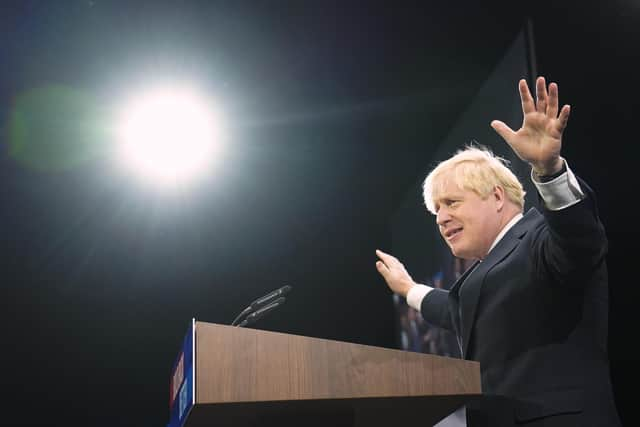Once you start disliking Boris Johnson, it’s hard to know how to stop - Euan McColm
For some of us, raging at the Prime Minister’s lies and dog whistles is all the exercise we get.
Johnson’s scandal-strewn private life combined with his political track-record of deception and inadequacy should - if you listen to those of us who consider him contemptible - be enough to prevent anyone ever voting for him.


Advertisement
Hide AdAdvertisement
Hide AdWhy, we wonder, would anyone dream of giving him their support? Surely, we tell ourselves, the time when his fans see the truth about their fatally-flawed hero will soon be upon us.
But hatred blinds. Those of us who despise Johnson’s premiership struggle to accept the things about the PM which we disdain are often the things many voters like.
Social media allows politicians and activists to provide running commentaries on major events, these days, and so there was a deluge of opinion during Johnson’s speech to the Conservative Party conference in Manchester last week.
It was, declared various Tories, a triumph. No, said various members of opposition parties, it was terrible, a hollow rambling mess that failed at any point to address the issues that matter to voters.
There was a flicker of good news for Labour supporters in the aftermath of the Prime Minister’s speech. A poll for Opinium found more people liked Keir Starmer’s speech to Labour conference a week before than approved of Johnson’s.
But what matters to Johnson is whether his speech chimed with the minority of voters he needs to keep onboard to ensure continued electoral victory.
Johnson’s speech was light on policy, It was, suggested one commentator, a perfectly good leader of the opposition speech.
This, I think, was fair but circumstances permitted such an approach. After all, don’t the pro-Brexit voters who backed Johnson’s Conservatives at the last General Election see themselves as part of an insurgency? Johnson may be PM with all the responsibility that rule carries but he is also the leader of a rebellion. He is the epitome of the establishment whose anti-establishment rhetoric has persuaded sufficient numbers of voters he is on their side.
Advertisement
Hide AdAdvertisement
Hide AdLabour activists worried about how their party can win back the so-called Red Wall seats in its former heartlands in the midlands and the north of England might want to look at the experience of their colleagues in Scotland.
When, after decades of unquestioning support, Scottish voters began to desert Labour, they grew contemptuous of the party. It was not enough for them to withdraw their support, voters had also to hate the party they’d once backed.
The SNP told these voters they had been betrayed by Labour and a lot of these voters agreed.
Labour may have been in opposition at Westminster for 11 years, but Red Wall voters were happy to blame the party for their unhappiness.
A culture war excuses the lack of logic that would see viewers punish an opposition party for failing them. Labour is, to a significant number of its former voters in England, part of an establishment that tried to deny Brexit. Old Etonian Johnson is the renegade sent to liberate them.
So, which opponents may have heard a speech light on detail and seemingly devoid of ideas, supporters will have head Johnson talk of the wasted potential of people in Doncaster and other parts of the north of England and been satisfied that he understood a problem that has existed for generations. They will have heard his optimistic predictions about the benefits of Brexit and been reassured they made the right decision when they chose, in 2016, to vote for the UK to leave the EU.
Surely the most difficult thing for Johnson’s opponents to accept is that a significant number of people do not, in fact, hear his voice and descend into rage. But the well-rehearsed bumbling-toff schtick which one person may find infuriating is a tell-it-like-it-is breath of fresh air for another.
Starmer’s speech may have been preferred by voters but polls continue to show a healthy lead for Johnson’s Conservatives.
Advertisement
Hide AdAdvertisement
Hide AdWe are used, in Scotland, to being led by a truly divisive figure. First Minister Nicola Sturgeon is adored by the Nationalist minority while unionist voters are so firmly opposed to her that tactical voting was commonplace in May’s elections.
A recent report by academics behind the Scottish Election survey showed that while the issue of independence remains a key issue for so many voters, they will continue to back a party that shares their position on the constitutional question. The consequence of this is that the SNP continues to attract support to win elections, regardless of its perforce in Government.
It seems possible a similar scenario might play out in England. Brexit differs from Scottish independence in that those campaigning for it have already achieved their objective. But the European issue has exposed other divisions in out society,
Johnson’s speech with its references to lefty lawyers and school sports days without winners was pitched to Brexit-supporting voters who believe the world is changing too fast. These are the people whose votes he will count on if he’s to win another election and he will give them what they want. And if that means dog-whistle racism and lies, then our Prime Minister is well practised.
Those of us who’ve made up our minds about the Prime Minister may satisfy ourselves that his speech was worthless but every aspect of it we dislike will have struck a chord with the Brexit-supporting voters who put Boris Johnson into power.
A message from the Editor: Thank you for reading this article. We're more reliant on your support than ever as the shift in consumer habits brought about by Coronavirus impacts our advertisers.
If you haven't already, please consider supporting our trusted, fact-checked journalism by taking out a digital subscription.
Comments
Want to join the conversation? Please or to comment on this article.
